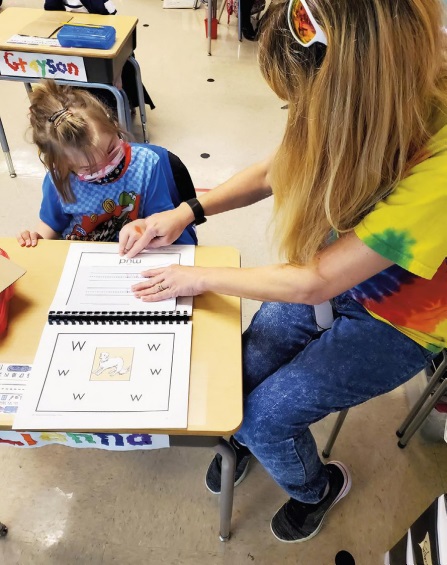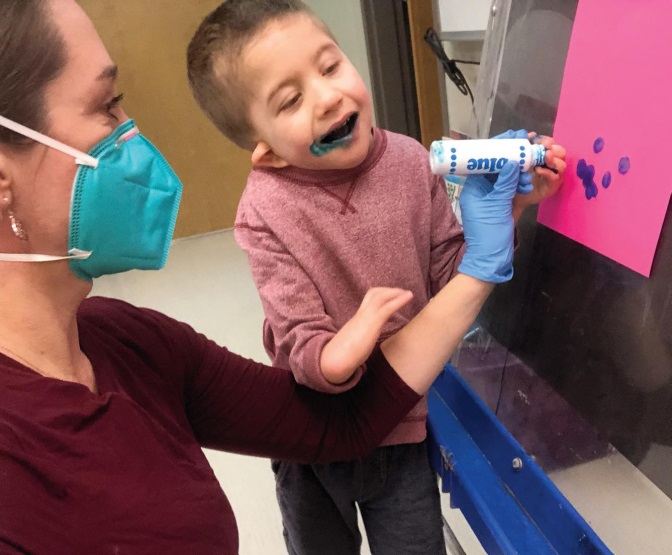

HANDS-ON: (Above left) An intervener aids a student with her letter writing; (Above right) A student works on a educational exercise with an intervener. Whether you are planning for the next school year, evaluating the current individualized education program (IEP), or reflecting on the past year, it is never too late (or too early) to consider the appropriateness of your child's services.
"Having an intervener has helped my son, Alex, tremendously. She has bridged the gap in Alex's world and his environment… She has brightened not only his life, but the whole family's life, and given us an understanding and a way to communicate, and everybody is so much happier." – Diane Foster
When the educational team determines that a child who is deafblind is unable to gather information via vision and hearing, they should consider how intervener services could play an important role, in providing access to that information and supporting the child's communication, concept, and social development. Whether you are planning for the next school year, evaluating the current individualized education program (IEP), or reflecting on the past year, it is never too late (or too early) to consider the appropriateness of your child's services. Many parents have shared how impactful it was for their child to have the services of a trained intervener. To hear more from the parents quoted in this article as they talk about the specific impact an intervener has had on their child who is deaf-blind, see the videos posted on the National Center for DeafBlindness (NCDB) webpage Parent Perspectives on Interveners (nationaldb.org/national-initiatives/iqp/parent-perspectives-on-interveners)
School districts and families may struggle to locate experts in deaf-blindness, but a number of helpful resources are available. Each state has a deaf-blind project that provides technical assistance and support to improve services for children from birth to 21, who are deaf-blind. To find out more, visit the NCDB website and locate your state's deaf-blind project at nationaldb.org/state-deaf-blind- projects. Project staff can provide expertise in deaf-blindness through training and support for educational teams.
Due in part to the lack of recognition of intervener services in many states, a majority of school districts do not have trained interveners readily available. In some cases, districts have been known to employ a paraprofessional and offer them intervener training
while on the job. In addition, several universities have intervener training programs:
- Central Michigan University Deafblind Intervener Undergraduate Certificate: lf.globalapp.cmich.edu/degreeConc/UCERT/DBI
- Utah State University Deaf-Blind Intervener Training Certificate: usu.edu/online/degrees/certificate/deafblind-intervener-training-certifi- cate/?ref=online.usu.edu
- San Francisco State University/California Deaf-Blind Services Intervener Training: cel.sfsu.edu/intervener
- Shawnee State University Intervener Technical Certificate [Ohio]. shawnee.edu/intervener-technical-certificate
Another avenue to obtain intervener training is through state-specific training cohorts provided by a state deaf-blind project. No matter how an individual accesses intervener training, the "gold standard" for high-quality training for an individual working with a student who is deaf-blind is coursework in deafblind intervention paired with coaching by a professional trained in deaf-blindness. Once an individual has received training, they can choose to pursue a national certificate (NICE; nationaldb.org/national-initiatives/iqp/national- intervener-certification-eportfolio) or credential (nrcpara.org/intervener).
A resource that helps teams determine the need for an intervener as part of their related services and supplementary aids and services, is the “Are Intervener Services Appropriate for Your Student with Deaf-Blindness? An IEP Discussion Guide” at nationaldb.org/media/doc/Intervener_Services_IEP_Team_Discussion_Guide.pdf
"Sometimes, as a student with deaf-blindness, although he's very able to communicate, if he misses something, he doesn't know what he's missed. He doesn't know what he hasn't heard or what he doesn't see sometimes. And so, it's very important for the whole team to come together, and to be there to help with those missing pieces for that information that he is missing, so he's better able to access better information and continue to grow as a learner." –Patti McGowan